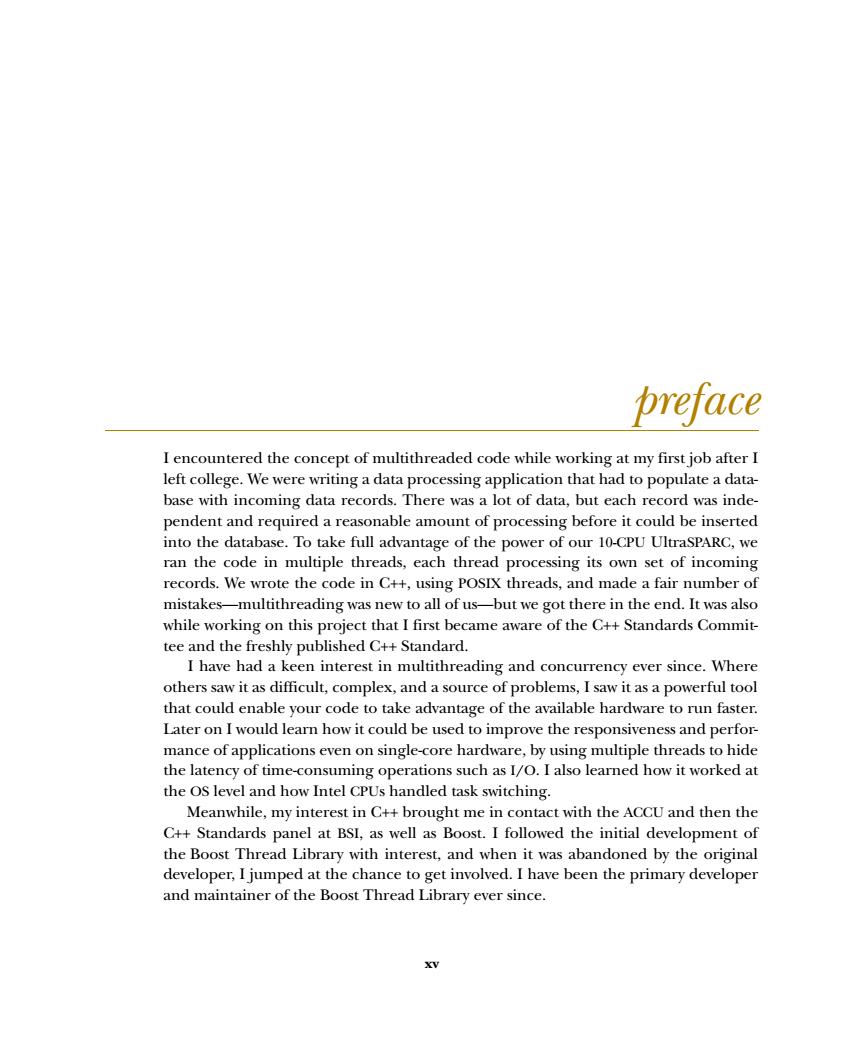正在加载图片...

preface I encountered the concept of multithreaded code while working at my first job after I left college.We were writing a data processing application that had to populate a data- base with incoming data records.There was a lot of data,but each record was inde- pendent and required a reasonable amount of processing before it could be inserted into the database.To take full advantage of the power of our 10-CPU UltraSPARC,we ran the code in multiple threads,each thread processing its own set of incoming records.We wrote the code in C++,using POSIX threads,and made a fair number of mistakes-multithreading was new to all of us-but we got there in the end.It was also while working on this project that I first became aware of the C++Standards Commit- tee and the freshly published C++Standard. I have had a keen interest in multithreading and concurrency ever since.Where others saw it as difficult,complex,and a source of problems,I saw it as a powerful tool that could enable your code to take advantage of the available hardware to run faster. Later on I would learn how it could be used to improve the responsiveness and perfor- mance of applications even on single-core hardware,by using multiple threads to hide the latency of time-consuming operations such as I/O.I also learned how it worked at the OS level and how Intel CPUs handled task switching. Meanwhile,my interest in C++brought me in contact with the ACCU and then the C++Standards panel at BSI,as well as Boost.I followed the initial development of the Boost Thread Library with interest,and when it was abandoned by the original developer,I jumped at the chance to get involved.I have been the primary developer and maintainer of the Boost Thread Library ever since. XVxv preface I encountered the concept of multithreaded code while working at my first job after I left college. We were writing a data processing application that had to populate a database with incoming data records. There was a lot of data, but each record was independent and required a reasonable amount of processing before it could be inserted into the database. To take full advantage of the power of our 10-CPU UltraSPARC, we ran the code in multiple threads, each thread processing its own set of incoming records. We wrote the code in C++, using POSIX threads, and made a fair number of mistakes—multithreading was new to all of us—but we got there in the end. It was also while working on this project that I first became aware of the C++ Standards Committee and the freshly published C++ Standard. I have had a keen interest in multithreading and concurrency ever since. Where others saw it as difficult, complex, and a source of problems, I saw it as a powerful tool that could enable your code to take advantage of the available hardware to run faster. Later on I would learn how it could be used to improve the responsiveness and performance of applications even on single-core hardware, by using multiple threads to hide the latency of time-consuming operations such as I/O. I also learned how it worked at the OS level and how Intel CPUs handled task switching. Meanwhile, my interest in C++ brought me in contact with the ACCU and then the C++ Standards panel at BSI, as well as Boost. I followed the initial development of the Boost Thread Library with interest, and when it was abandoned by the original developer, I jumped at the chance to get involved. I have been the primary developer and maintainer of the Boost Thread Library ever since